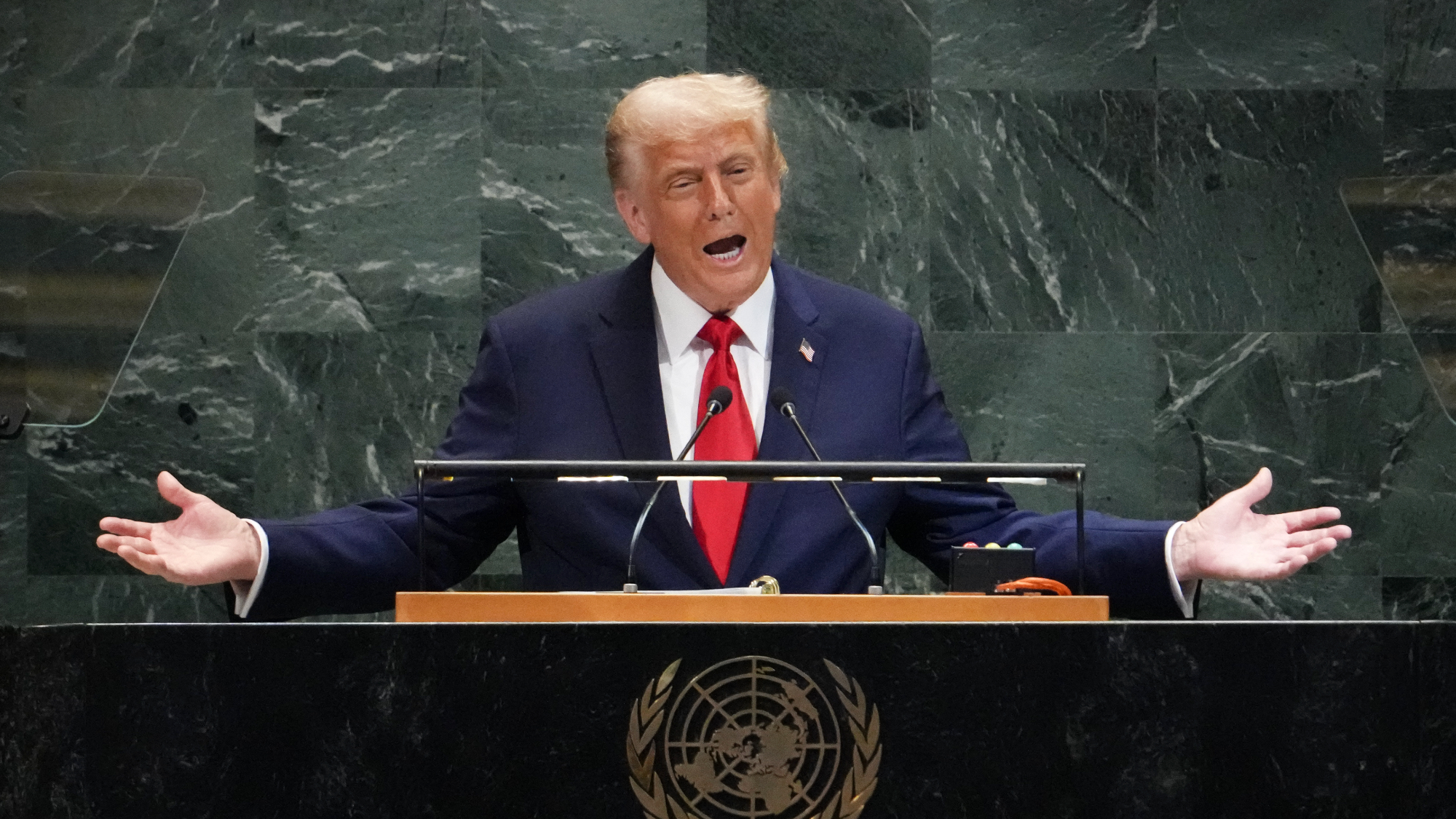What is in the Green Party’s manifesto?
As Britain heads to the polls, here’s a final look at the environmental party’s manifesto

A free daily email with the biggest news stories of the day – and the best features from TheWeek.com
You are now subscribed
Your newsletter sign-up was successful
The Green Party of England and Wales is leading its manifesto with a promise to achieve net zero carbon emissions in the UK by 2030.
The party is also pledging to spend £100bn a year by that deadline to tackle climate change, as part of a “Green New Deal” that co-leader Jonathan Bartley says is the “most ambitious” plan of its kind “proposed anywhere in the world”.
“While the other parties are trying to catch up, we’re still racing ahead, reaching new horizons,” Bartley added following the manifesto launch last month.
The Week
Escape your echo chamber. Get the facts behind the news, plus analysis from multiple perspectives.

Sign up for The Week's Free Newsletters
From our morning news briefing to a weekly Good News Newsletter, get the best of The Week delivered directly to your inbox.
From our morning news briefing to a weekly Good News Newsletter, get the best of The Week delivered directly to your inbox.
The party has described today’s vote as the “climate election”, amid growing public concern about environmental issues. In a year that has seen school students nationwide going on strike and Extinction rebellion protesters shutting down swathes of central London, what are the Greens offering voters?
The Greens backed Remain in the 2016 EU referendum and “continue to believe that membership of the EU makes our future more hopeful and secure”, says the party.
They would legislate, through a People’s Vote Bill, for a confirmatory referendum on the detail of whatever Brexit deal is made, with the option to reject the deal and stay in the EU.
A free daily email with the biggest news stories of the day – and the best features from TheWeek.com
They want a relationship with the EU that offers freedom of movement, with the UK remaining part of the EU single market, and rights for people and the environment protected. They would guarantee the rights of EU citizens to remain in the UK, and seek the same deal for UK citizens in the EU.
Climate
The environment is “at the heart of everything” the Greens do. The party plans to put £100bn a year by 2030 into policies that tackle the climate crisis.
The party would introduce a green new deal bill to “get the UK on track to reducing climate emissions to net zero by 2030”.
The manifesto includes pledges to build 100,000 new zero carbon homes for social rent each year. The Greens would also improve tenants’ rights and lower rents.
Co-leader Jonathan Bartley told BBC Radio 4’s Today programme: “When we’re facing an existential threat, we don’t hold back, we know that we have to tackle it.
“Frankly if the climate were a bank, we’d have bailed it out by now.”
Health
The Greens would introduce an NHS reinstatement bill, which would increase funding for the health service by at least £6bn per year, until 2030.
Like Labour, they would “roll back privatisation of the NHS” and guarantee that all health and dental services are provided free.
Defence
The party would scrap the Trident nuclear programme replacement, which it claims would save “at least £110 billion over the next 30 years”.
It would stop arms sales to “oppressive regimes” and introduce an “ethical” foreign policy that is aimed at conflict resolution rather than “aggressive wars of intervention”.
Education
The Green manifesto pledges to completely scrap university tuition fees, fund full student grants and invest more in further and higher education.
The party has also said it will increase and protect spending per school pupil. It will offer free universal early education and childcare for all children, with formal education starting at the age of seven.
Like Labour, the Greens would abolish Ofsted – something former Ofsted chief Sir Michael Wilshaw described as “bonkers”.
The Greens would bring back Education Maintenance Allowance and make apprenticeships open to all qualified young people aged 16 to 25.
Transport
Like Labour, the Greens have pledged to return the railways to public ownership and re-regulate buses.
To tackle climate change, the party would cancel all airport expansions and end subsidies on airline fuel, and would introduce incentives to take diesel vehicles off the roads.
Welfare state
One of the Green Party’s most radical ideas is the introduction of universal basic income bill, which would legislate to introduce “unconditional” payments for everyone in the country “above their subsistence needs”.
Unveiling the policy, Green Party co-leader Sian Berry said: “Financial security is the key to a good society... people receiving a universal income will have more choices, and more people will be able to cut working hours to retrain, start new green businesses, take part in community action or simply improve their well-being.”
Electoral reform
The Greens would introduce proportional representation voting and an elected upper house of parliament, scrapping the House of Lords.
They would lower the voting age to 16 and give young people the chance to “take an active role in democracy” by introducing non-biased political education and promoting “active citizenship”, says the party website.
How are the other parties trying to win our vote?
Here are The Week’s guides to the main parties’ policies:
The Tory manifestoThe Labour manifestoThe Liberal Democrat manifestoThe Brexit Party manifestoThe general election manifestos at a glance
-
 How Democrats are turning DOJ lemons into partisan lemonade
How Democrats are turning DOJ lemons into partisan lemonadeTODAY’S BIG QUESTION As the Trump administration continues to try — and fail — at indicting its political enemies, Democratic lawmakers have begun seizing the moment for themselves
-
 ICE’s new targets post-Minnesota retreat
ICE’s new targets post-Minnesota retreatIn the Spotlight Several cities are reportedly on ICE’s list for immigration crackdowns
-
 ‘Those rights don’t exist to protect criminals’
‘Those rights don’t exist to protect criminals’Instant Opinion Opinion, comment and editorials of the day
-
 Trump’s EPA kills legal basis for federal climate policy
Trump’s EPA kills legal basis for federal climate policySpeed Read The government’s authority to regulate several planet-warming pollutants has been repealed
-
 How corrupt is the UK?
How corrupt is the UK?The Explainer Decline in standards ‘risks becoming a defining feature of our political culture’ as Britain falls to lowest ever score on global index
-
 The high street: Britain’s next political battleground?
The high street: Britain’s next political battleground?In the Spotlight Mass closure of shops and influx of organised crime are fuelling voter anger, and offer an opening for Reform UK
-
 Trump pulls US from key climate pact, other bodies
Trump pulls US from key climate pact, other bodiesSpeed Read The White House removed dozens of organizations from US participation
-
 Trump aims to take down ‘global mothership’ of climate science
Trump aims to take down ‘global mothership’ of climate scienceIN THE SPOTLIGHT By moving to dismantle Colorado’s National Center for Atmospheric Research, the White House says it is targeting ‘climate alarmism’
-
 Is a Reform-Tory pact becoming more likely?
Is a Reform-Tory pact becoming more likely?Today’s Big Question Nigel Farage’s party is ahead in the polls but still falls well short of a Commons majority, while Conservatives are still losing MPs to Reform
-
 The launch of Your Party: how it could work
The launch of Your Party: how it could workThe Explainer Despite landmark decisions made over the party’s makeup at their first conference, core frustrations are ‘likely to only intensify in the near-future’
-
 ‘It’s ironic in so many ways’
‘It’s ironic in so many ways’Instant Opinion Opinion, comment and editorials of the day